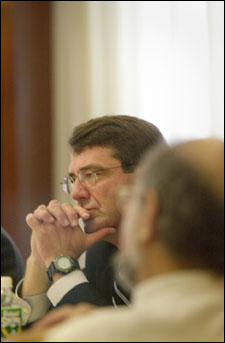KSG conference defines, discusses ‘rogue’ states
Sessions probe ways of dealing with rigid, repressive states

Diplomats, academics, and leaders of nongovernmental organizations gathered at the John F. Kennedy School of Government last week for a three-day conference examining the world’s “rogue” states and how best to handle them.
Robert Rotberg, director of the Program on Intrastate Conflict, Conflict Prevention, and Conflict Resolution, said the international community has strategies to deal with different types of nations, with one exception. Those countries, loosely termed “rogue” states, appear around the world, have different origins, but share similar characteristics.
They are repressive to their own populations and uncooperative with the international community, but unlike a failed state, they have rigid government structures and tight control over power.
“We’re trying to see, through this meeting, what comparability we see between these disparate states and what U.S. policy should be towards them,” Rotberg said.
The conference, held Oct. 14-16, was called “Winning the Prize for Repression: The ‘Real’ Rogue States?” and was sponsored by the Belfer Center for Science and International Affairs’ Program on Intrastate Conflict, Conflict Prevention, and Conflict Resolution, and by the World Peace Foundation.
Thus far, Rotberg said, the United States has had disparate policies for these nations, virtually ignoring some, such as Burma, and focusing much time and attention on others, such as nuclear-armed North Korea.
The meeting featured a variety of sessions dealing with nations including Turkmenistan and Uzbekistan, Burma, North Korea, Syria, Tunisia, Belarus, Iran, Saudi Arabia, Togo, Equatorial Guinea, and Zimbabwe.
In one session, Marcus Noland, of the Institute for International Economics, said North Korea represents a particularly difficult situation because of its nuclear weapons capability.
The nation’s people have been suffering through more than a decade of food shortages that has killed between 600,000 and 1 million people. Despite that internal privation, the leadership of Kim Jong Il remains strong, Noland said.
North Korea treats its own people “barbarously,” Noland said. In addition to the food shortages, North Korea has one of the largest militaries in the world and is extremely repressive, with an extensive prison system that practices multigenerational imprisonment and torture, and has high death rates.
The North Korean economy has failed, Noland said, and much of the famine is a result of human mismanagement rather than natural conditions. The North Korean regime, Noland said, is virtually criminal. It has not only violated nuclear agreements, but also is a state sponsor of terrorism and has engaged in drug trafficking and trade in endangered species.
“If we could apply the RICO statute internationally, we could prosecute the state as a criminal enterprise,” Noland said.
All that having been said, North Korea has to be handled carefully because of its nuclear arms. Despite these difficulties and unlike some other rogue nations that are so insular the international community has no influence, North Korea does have relationships that can be used.
Ashton Carter, Ford Foundation Professor of Science and International Affairs, who served as an assistant secretary of defense under President Bill Clinton, said the Bush administration’s misreading of the situation in Iraq under Saddam Hussein makes him cautious about the accuracy of information coming out of modern North Korea.
Carter said he didn’t think that diplomacy would work to curb North Korea’s nuclear weapons program and that some kind of pressure would have to be brought to bear.
That pressure, he said, at least initially should be economic. That means nations that have better economic relations with North Korea, especially China, are indispensable allies.
Carter said he’s concerned that the situation has deteriorated in recent years, as nuclear material that was once monitored is now hidden. He also said North Korea may have grown bolder by the lack of a strong policy, what he called the U.S.’s “carrotless, stickless approach.”
Over the course of the three days, Rotberg said, participants discussed many common characteristics of these rogue nations and decided that the term “rogue” was too imprecise to be valuable in analysis.
Participants preferred to think of the nation-states under examination as repressive. Only some, such as North Korea and Iran, are also outwardly aggressive. A few states, like Tunisia, abuse their own people but are no threat to others.
Rotberg said that a subsequent meeting of experts on the “rogue” states will develop data sufficient to rank the countries according to their separate degrees of repression and aggression. United States policy toward such states will best be made when those differences in repression and aggression are better understood.




